Emphasis
① OpenAI CEO Sam Altman He once regarded Elon Musk as his "mentor". For years, Altman has relied on Musk's fame and wealth to promote the development of OpenAI.
② Musk also played an important role in the recruitment of the OpenAI team, helping to recruit Ilya Sutz, an artificial intelligence scientist working at Google. Keifer. To attract and retain these top talents, OpenAI offers new employees equity in Tesla and SpaceX, as well as the opportunity to benefit from Y Combinator investments.
③ In February 2018, OpenAI executives rejected Musk's proposal to take over the company, which led to his decision to resign as co-chairman.
④ Although Musk no longer directly provides financial support for OpenAI, the relationship between him and Altman has not been completely severed. The two continued to discuss the topic of artificial intelligence and expressed support for each other in public on many occasions.
⑤ The advent of ChatGPT has escalated the dispute between the two. Musk is worried that its technology will accelerate the dangerous race to develop powerful artificial intelligence and have potential consequences for human society. risk, and announced that it had cut off OpenAI’s data access to the X platform.
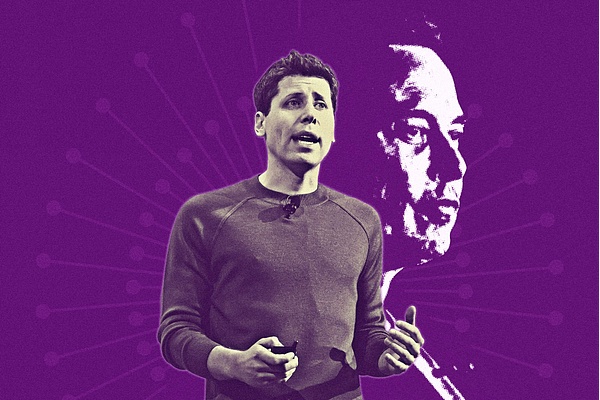
Tencent Technology News March 6, according to foreign media reports, as a leader in the field of artificial intelligence, OpenAI CEO Sam Altman once regarded Elon Musk as his "mentor." However, the two's differences in business philosophy not only led them to part ways on the road to entrepreneurship, but also fell into a fierce dispute.
Musk accused Altman of deviating from OpenAI’s original intention in pursuit of profits, while the latter firmly denied it. This dispute not only exposed the problems between Musk and Altman, but also highlighted that the balance of power in the field of artificial intelligence is being broken. This issue of "Silicon Valley Cover" sorts out and reproduces the grudge story of "brotherhood and antagonism" between Altman and Musk.
Once a "hero" becomes an opponent
More than a dozen When Altman first stepped into the SpaceX headquarters in Southern California two years ago, he was immediately fascinated by Musk's ambition. At the time, the young entrepreneur was at a crossroads in his life after selling his first company at a disappointing price. Musk, who is 14 years older than Altman, has already planned to launch a spacecraft to Mars. Altman later wrote: "When I left, I thought: 'Ha, this is the standard for my belief.'"
Today, Altman Terman has become a star in the field of artificial intelligence, serving as CEO of OpenAI. However, recently he experienced firsthand how firm his "former mentor's" beliefs were, and Musk did not hesitate to declare war on him personally. In last week's lawsuit, Musk accused Altman of deviating from OpenAI's original intention and mission in pursuit of profits, a charge OpenAI has firmly denied. This dispute not only exposed the changes in the balance of power in the field of artificial intelligence, but also allowed people to see the different pursuits and concepts of the two technology giants.
Musk and Altman co-founded the non-profit research laboratory OpenAI in 2015 to promote the development of artificial intelligence in a way that benefits all mankind. Musk provided tens of millions of dollars in early funding. However, with the gradual commercialization of OpenAI's products, capital injections from giants such as Microsoft, and the establishment of Musk's own artificial intelligence startup xAI, differences between the two gradually emerged.
On the day Musk filed the lawsuit, Altman expressed his disappointment and helplessness in a memo to employees. He called Musk his "hero" and wrote: "I like to think of Musk as a builder, someone who competes by trying to build better technology. However, this situation makes me very sad, I still hope he can be on our side." Regarding this dispute, OpenAI said that the company will take action to refute all of Musk's accusations.
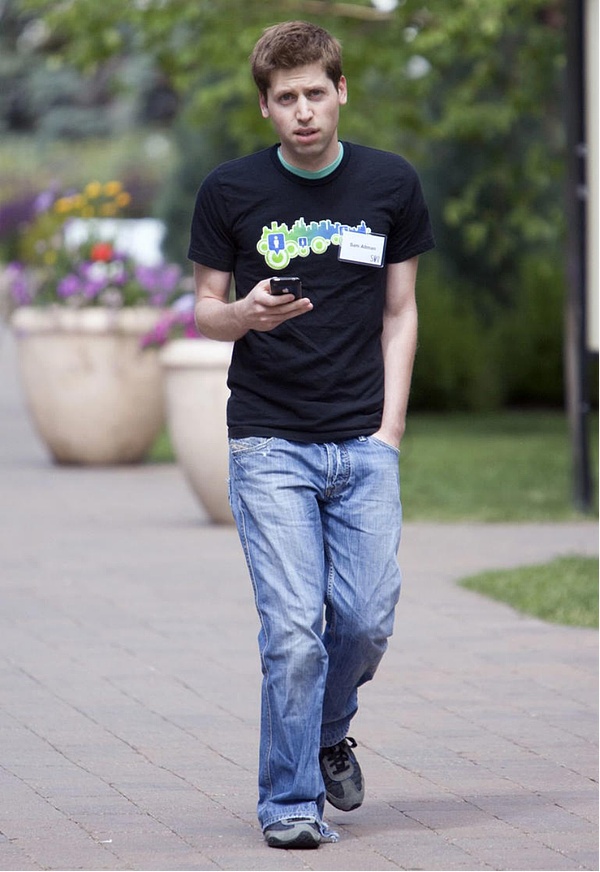
In fact, Altman has been relying on Musk's reputation and wealth to promote the development of OpenAI for many years. They have joined forces to counter Google's leadership in artificial intelligence and work together to advance the industry. However, as OpenAI gradually rose to prominence, rumors that the relationship between the two had soured began to surface.
According to people close to Altman, Musk is jealous that Altman has stolen his limelight in the field of artificial intelligence, and he is more concerned about how to defeat OpenAI, not the security of artificial intelligence itself. However, people close to Musk insist that his concerns about the safety of artificial intelligence are real and deep, and that he believes that his other artificial intelligence startup xAI is critical to developing a better alternative to OpenAI.
These opinions are based on conversations with dozens of people familiar with the internal affairs of Altman, Musk and OpenAI, as well as the disclosure of court documents and internal documents .
The launch of the "Manhattan Project" in the AI industry
Review Altman’s acquaintance with Musk was thanks to Y Combinator partner Jeff Ralston. As an influential startup incubator, Y Combinator provided financial support for Altman’s first company, the location-based social network application Loopt.
At that time, Altman had just sold his shares in Loopt as an early investor and was at a crossroads in his life. He spent time in an ashram in India, contemplating whether to start a new company or devote himself full-time to investing. Musk has developed a commercial spacecraft that can transport cargo from the space station and return to Earth. He firmly believes that this is a key step towards realizing humans becoming an interplanetary species.
Musk is increasingly worried about the rapid development of artificial intelligence technology. According to his lawsuit, this concern stemmed from a pivotal meeting in 2012 with Demis Hassabis, the co-founder of artificial intelligence company DeepMind. At that meeting, Hassabis "underlined the potential dangers that advances in artificial intelligence pose to society." It’s worth mentioning that, although it’s not explicitly mentioned in the lawsuit, Musk invested in DeepMind after that meeting to keep a closer eye on the direction of the technology.
Later, Musk was shocked when he learned that Google planned to acquire DeepMind. According to the indictment, he teamed up with Luke Nosek, co-founder of online payments company PayPal, to propose an unsuccessful bid. Google successfully acquired DeepMind, which became a lingering regret in Musk's heart.
Unlike Musk, Altman has had a strong interest in artificial intelligence since he was a child. At 18, he put artificial intelligence at the top of his list of questions he wanted to explore. As his profile grew in Silicon Valley, Altman worked to focus the tech industry's attention on the vast potential of artificial intelligence. In 2014, he published an article on his personal blog saying that artificial intelligence may be "the greatest technological advancement in history." Days later, he was named head of Y Combinator, a company that had successfully invested in Dropbox and Airbnb, and later OpenAI.
Similar to Musk, Altman is also worried about the potential dangers of artificial intelligence technology. In February 2015, he wrote in an article that artificial intelligence "may be the greatest threat to humanity's continued existence."
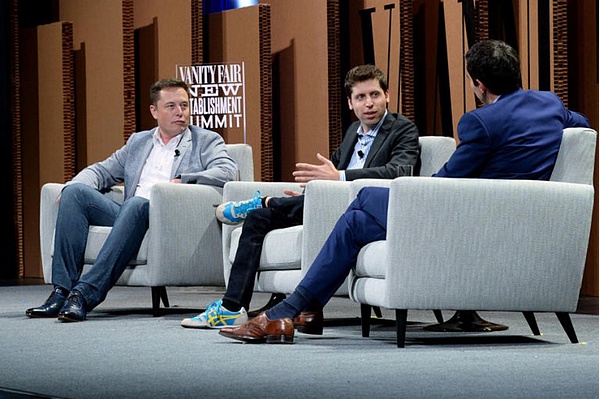
Altman and Musk have been in close communication on these issues. In March of the same year, Altman took the initiative to contact Musk to discuss whether he should draft an open letter to the U.S. government on artificial intelligence. By May, he made a more specific proposal to Musk via email, hoping that Y Combinator could launch a "Manhattan Project" in the field of artificial intelligence. Musk agreed, replying: "It might be worth talking about."
The two then began working together on a new artificial intelligence lab The creation, Musk named it OpenAI. In a June 2015 email, Altman proposed the idea of forming a five-member board of directors, led by the two of them, to manage and direct the nonprofit's operations. He suggested waiting until the laboratory is officially established before issuing an open letter calling for stronger regulation of artificial intelligence. Musk agreed, replying: "I agree with both."
To attract top talent, Altman invited computer scientist Greg Blow Kerman joins OpenAI from payments processing company Stripe where he served as chief technology officer. Musk also played an important role in helping recruit Ilya Sutskev, a prominent artificial intelligence scientist who worked at Google, the indictment said. To attract and retain these top talents, OpenAI plans to provide new employees with equity stakes in Tesla and SpaceX and the opportunity to benefit from Y Combinator investments.
Musk was once the largest "funder" of OpenAI
Musk and Altman served as the first co-chairmen of OpenAI. Behind the scenes, however, Musk appears to have greater influence and control over the company, according to some former employees. He's often in the office, pitching forward-thinking ideas and polling employees on their thoughts on when general artificial intelligence will be possible. In addition, OpenAI shares office space with Neuralink, Musk’s brain implant startup, further demonstrating his core position in the company.
In addition to his active participation in company operations, Musk is also an important financial pillar of OpenAI. According to an email from Musk included in a blog post published by OpenAI on Tuesday, he had urged the nonprofit to announce a $1 billion funding commitment to "avoid dwarfing spending by Google or Facebook." Hope,” and pledged to fill any funding gaps.
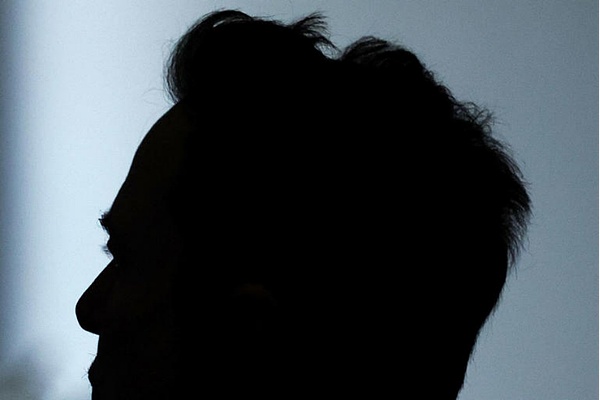
The indictment states that Musk ultimately donated $44 million to OpenAI. He donated $15 million in 2016 and $20 million in 2017, becoming the largest funder in those two years. In addition, the indictment also mentioned that he also shouldered OpenAI’s rental costs for many years.
Musk has also played an active role in promoting OpenAI research. He encouraged researchers to come up with innovative projects that would give OpenAI an edge over other companies like DeepMind in the field of artificial intelligence. For example, a research team plans to beat the world's best players in the video game "Dota 2", a project that has been actively supported and promoted by Musk.
By 2017, although OpenAI invested a lot of resources in the field of artificial intelligence, it still failed to achieve breakthrough research results. The situation made Musk increasingly anxious, and he began to increase pressure on employees, sometimes even threatening to quit the project.
Google paper sparks disagreement between Mars and Austria
At the same time , Google released a paper on a new artificial intelligence model called "Transformer", which lays the foundation for the development of large language models and provides powerful power for tools such as humanoid chatbots. This paper reveals that the key to achieving this goal lies in processing large amounts of data, which requires huge computing power.
Faced with this challenge, Brockman and other OpenAI members proposed turning the organization into a for-profit institution to raise more money from investors such as Microsoft. More funds. However, Musk is firmly opposed to this idea. He wrote in an email to Brockman, Sutzkefer, and Altman: "Either I do something myself, or I continue to operate OpenAI as a non-profit organization. Unless you make a firm commitment, I will No more funding for OpenAI. I'm not a fool and don't want free money for a startup. The discussion is over."
Altman responded that he still “Passionate about this nonprofit.” However, Musk’s attitude seems to have become irreversible. OpenAI revealed in a blog post on Tuesday that while Musk eventually recognized the need to form a for-profit entity, he wanted to gain a majority stake, initial board control and serve as CEO. During discussions, he declined to provide further funding. Ultimately, OpenAI relied on another investor, Reid Hoffman, co-founder of the professional networking site LinkedIn, to pay the bills.
Musk's desire to control OpenAI has become increasingly strong, and he even made a bold suggestion: merging OpenAI into his electric car company Tesla . He wrote in an email: "Tesla is the only company that has any hope of competing with Google. Even so, the possibility of competing with Google is very small, but at least it is not zero.
Musk began trying to persuade OpenAI researchers to join Tesla, which annoyed his colleagues. By February 2018, OpenAI executives rejected his offer to take over the company, which led to Musk decided to resign as co-chairman. Ultimately, Altman took over as CEO and continued to lead the development of OpenAI.
After Musk resigned At the meeting, Altman thanked him for his contribution to OpenAI. Musk told employees that he would continue his own artificial intelligence research at Tesla. When a young researcher expressed concern about Musk’s decision questioned, believing that this would intensify competition in the field of artificial intelligence. In response, Musk called the researcher a "moron" and left the venue angrily.
At the end of 2018, Musk sent another email to Altman, Brockman, and Sutzkever. In this email, he predicted that OpenAI would eventually fail. He wrote: "In execution Without major changes in resources and resources, I think the probability of OpenAI defeating DeepMind/Google is 0%. ”
Although Musk no longer directly provides financial support for OpenAI, the relationship between him and Altman has not been completely severed. The two continue to discuss The topic of artificial intelligence was discussed, and Musk was still paying rent for OpenAI. After Altman established OpenAI’s for-profit subsidiary in March 2019, he also publicly expressed his support for Musk.
When investors began shorting Tesla's stock, Altman staunchly came to Musk's defense. He tweeted in May 2018 It read: “It’s so disgusting to see so many people against Tesla! From a historical perspective, it would be a mistake to bet against Musk. ”
The advent of ChatGPT led to the escalation of the dispute between Mars and Austria
However , Musk's relationship with Altman suffered a serious blow in November 2022, when OpenAI released ChatGPT. Although this innovation attracted widespread attention and praise, Musk publicly expressed concerns about chatbots. He worries that this technology will accelerate the dangerous race to develop powerful artificial intelligence, thereby creating potential risks to human society.
In addition, Musk also began to tweet questioned the way OpenAI was run and funded. How did the nonprofit he co-founded become a for-profit entity that raised billions of dollars from Microsoft? These questions sparked widespread discussion and controversy and became a provided the basis for Musk to file a lawsuit.
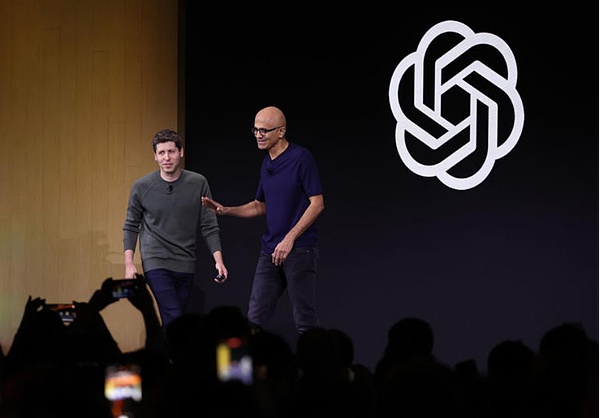
Shortly after OpenAI released ChatGPT, Musk took a series of actions. He announced that he was cutting off OpenAI's access to the data of the social media platform X that he acquired. Previously, OpenAI had been considering using These data are used to train its model.
In order to solve this problem, Altman invited Musk to the OpenAI headquarters for a long closed-door meeting. Here During this meeting, the two had an in-depth discussion about X's decision and ChatGPT. It is speculated that Musk may have revealed to Altman his idea of starting a general artificial intelligence company during this meeting. This news made Altman was anxious.
A few months after the launch of ChatGPT, Musk began trying to poach OpenAI employees for xAI. In addition, he threatened to sue Ultraman and OpenAI, this has further escalated the conflict between the two parties.
In November last year, Musk launched his own chat robot Grok and described it as A less "woke" competitor to ChatGPT. To make the new chatbot more competitive, Musk gave it access to X's online database and provided it with office space in his San Francisco office.
In recent weeks, xAI has begun preparing for a new round of financing, which will undoubtedly provide more financial support for its competition with OpenAI. As Musk files a lawsuit and xAI's financing plan gradually advances, competition in the field of artificial intelligence will become more intense and complex.
After Musk filed the lawsuit, Altman wrote a memo to his employees: "Seeing benefiting humanity and starting a business in some way The conflicting views are really confusing. I still miss the old Musk." (Compiled by Golden Deer Helen)
 Catherine
Catherine










